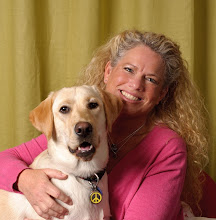
This is exactly the kind of appointment that everyone who ever wanted to be a veterinarian thinks of-a healthy, happy brand new puppy. Snickerdoodle is a 3 month old Havanese and Poodle cross-as cute as a bug and has never met a human she didn't instantly love. It's a good thing she can't run out of kisses-she doles them out fast and furious, interspersed with some "tastes" with those needle teeth. Doodle is filling the shoes (paws) of her owners first dogs who both passed away at 16 years of age. If this is any indication, she will have herself a lifetime full of love and care-just what every new puppy needs and deserves.
When we schedule new puppy or kitten visits, we make sure the new owners have a good chunk of time, at least an hour, that they can spend with us. We want to ensure we get the opportunity to go over all the basic care instructions, especially if the humans have never had pets before or, as is the case with Snickerdoodles owners, it has been a long time since they have had a puppy to raise. Their geriatric dogs just didn't have nearly the level of energy and "got things to do" as this new family member does. As is often the case, every staff member plays a part in a new puppy or kitten exam.
Receptionists of course get to book the first appointment and greet the proud new owners. They find out where the puppy or kitten was found or purchased as there can be certain issues that crop up as a result of coming from a shelter or a pet store for example. "Back yard breeder" or puppy mill dogs also have their own types of challenges to over come, and knowing their source is important for their management. Receptionists will also give the owners some information on the puppy or kitten "plan" we offer which bundles together all the early exams, vaccines, deworming and other getting started procedures. Clients who opt for one of these plans also receive a discount on their pet's spay or neuter when the time for that surgery comes around.
An assistant or technician will usher the family into an exam room and start by getting a weight on the pet. It will be important to monitor their weight as they are growing up, ensuring they aren't too thin and possibly parasitized or undernourished nor getting too fat and possibly stressing those growing joints. The assistant or technician takes 20 to 30 minutes thoroughly discussing everything from potty training-a very important subject!-to feeding and nutrition. They will talk about the various diseases we want to vaccinate against and when we will do so, explaining immunity, booster vaccines, etc. Deworming and flea control, along with zoonoses or diseases humans, especially children if they are present in the family, can pick up from the pet are mentioned and then often the first doses of preventatives are given. Basic vital signs are taken and any health problems are noted.
The puppy or kitten may be taken in the back to collect a sample of feces, do a skin scraping or microscopic exam of ear debris if indicated, or draw blood for viral testing. Our hospital attendants help restrain the wiggly critters, ensuring this is a gentle procedure with lots of treats and reassuring. We sure don't want them remembering this place as bad or scary-they will be coming to see us throughout their lives and we want to start them off right.
Next comes the veterinarian's part of the visit-that would be me. I will introduce myself to new owners and/or congratulate others on the new family member. I will do a thorough health exam on the puppy or kitten, eating up the wiggly kisses or purrs. I am so glad I can get my "fix" at work and don't have to take everything home. I try to fill out a health report card so owners have a record of the exam and any notes of problems or issues we discussed. Sometimes there will be an umbilical hernia for example-we will note this and plan to repair it at the time of the spay or neuter. I do my best to answer any questions that come up, often referring owners to web sites I trust or trainers we work with. Finally we pop in those icky vaccines and discuss what to watch for in case the pet has an adverse reaction to them.
The assistants or technicians then wrap up the appointment, making sure the owner's have had their questions answered, have all of their samples and literature to refer to later, and be sure they know how to reach us if other questions arise. Receptionists will take care of the money part (yep, I have to pay my staff and suppliers, too) and arrange for booster vaccine appointments. I always make sure owners know to stop on in anytime they are out and about with their pets, just coming by for a social visit-cookies and kisses-so they won't associate us with just thermometers and shots and all the "bad" things. We want our patients to love coming to see us, and most of them really do. Then the new family is good to go.
New puppy and kitten visits are highlights of the day, making up for emotional euthanasia appointments or crummy diagnoses of cancer and all. Happy, busy puppies and kittens just don't have time to be sad. They live for the moment-and if they are lucky like Snickerdoodle, that moment is always wonderful.
Peace,
DrReneigh

No comments:
Post a Comment